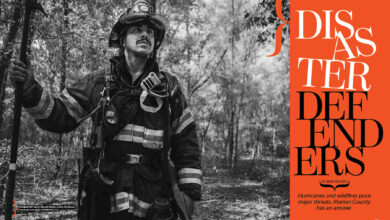WRITTEN BY: Kelli Fuqua Hart, Ocala Magazine’s Executive Editor
Sitting alone in his car, 22-year old Ocala native, Chris Johnson, took his life on an otherwise ordinary Saturday morning. With one gunshot wound to the chest, Johnson’s young life was gone. It would leave a family in angst, friends confused, colleagues stunned and the nation asking, “Why?”
Why would this Duquesne University and former Florida Gator super-athlete feel compelled to cut short a future of endless opportunities? Surrounded by supporters, why didn’t Johnson reach out to someone before making the decision to end his life? What was so burdensome for this handsome young man that he felt there was no hope, no answers, except to fire that gun before sunrise on February 28th, 2015?
This is the enigma we call “suicide.”
“Sitting in an arm chair,” Annmarie Delfino begins, painting a picture of the last time she’d ever see Johnson, “Chris gave, what I now believe was his ‘goodbye’ speech to me.” Having known Chris “Juice” Johnson since adolescence, Delfino calls him, without hesitation, “son.” Despite having three sons of her own, Johnson has played an integral part in the Delfino family and likewise, they have played an integral part in his.
“Chris spent a great deal of time in our home and considered my children to be his siblings,” explains Delfino, trying to hold back tears during this interview. Perhaps this is why Johnson ended up on her doorstep midday, January 30th, with a slumped posture and sulking disposition.
Delfino recalls immediately sensing something was wrong. Here was this otherwise charming, upbeat, positive young man appearing unusually depressed and conflicted. Some dialogue pursued and Johnson explained to Delfino, or “Mama D” as Chris called her, “I don’t want to do this anymore.” He then rattled off a list of things he didn’t want to do anymore, including playing football. It seems there was a great deal of pressure for him to continue playing.
Several conversations ensued about Johnson’s football career while he was visiting. He had convinced the Delfino family that his mind was made up about football and even mentioned wanting to find a job in Ocala, finish out his classes online and enlist in the Marine’s Infantry division. “We love and support Chris, no matter what,” Delfino reassured.
Silence
Struggling through tears, Delfino proceeded to go on and on about how Chris was “more than football.” It didn’t matter to Mama D what Johnson decided to do, so long as he was happy and would feel proud of having done his best and given it his all. Just a few months shy of graduating from college, “I encouraged him to finish out his goal of graduating and reminded him how proud we all were of him,” Delfino continued through broken words and tears. Without elaborating, Delfino said there was more to Johnson’s story than just his issue with football – something he felt extremely overwhelmed by.
With talk of joining the Marines, Johnson and Delfino’s son Ross spent that Friday browsing guns at Value Pawn, Walt’s Pawn and a third shop on North 441. Today, where or when Johnson purchased his gun is still unclear, but Ross believes it was that Friday.
The next few days Johnson had plans to see a few other people including a Marine recruiter and his grandfather. February 3rd, would be the last time Deflino saw Johnson. After visiting with his grandfather, “Chris appeared to be himself again,” recalls Delfino.
Wednesday, February 4th, Johson flew back to Duquesne. In an exchange of text messages, Delfino was wishing Johnson safe travels and encouraging him to let her know when he had arrived to Pennsylvania safely. Johnson, on the other hand, was reassuring her he was safe and sound, back on campus. Strangely enough, on Saturday, February 7th, Johnson was back in Ocala.
Rachel and Ryan Delfino were shocked to see Johnson back home. He was excited to show them a silver Chevy he had gotten from a friend and a .45 he told Ryan he planned to use for target practice to help prepare him for the Marines. Leaving, yet again, Johnson told Rachel, “I’ll see you soon.”
“Chris was here and then gone and then back again. It was as if he wanted to be home but felt torn,” explains Delfino.
Was there something Johnson wanted to say, but couldn’t? If so, why?
Using facebook as a catalyst to get the dialogue on suicide flowing, I mentioned that I felt compelled to write on the subject because far too often suicide is whispered about rather than openly discussed. Why? Why have we no voice on this subject?
If I catch a nasty stomach bug, I’d not hesitate to call my physician in an effort to seek help. In fact, I’d not hide my being ill, but rather reach out to family and friends for sympathy. Almost daily, on social media, I see individuals posting about a recent diagnosis of sorts in hopes of gaining support or encouragement from loved ones. Why are we so quick to discuss and share our bouts of physical illness, but reluctant to, often fearful when it comes to talking about symptoms of mental illness? – assuming mental illness is the underlying antagonist of suicide.
Why has society created terms used to brand individuals with mental illness – terms such as “psycho,” “nut case” and “cuckoo,” but refrains from the same types of name calling when it comes to someone with a physical ailment?
Stigma
“It’s embarrassing,” explains my dear friend Anita Carman, who opened up to me and courageously shared her story to better help me understand what it feels like to live with the demons of suicide everyday. “You don’t want to tell anyone because they’ll think you are crazy. You look weak.” And she follows this explanation by second-guessing, out loud, if she can even allow me to attach her name to this story.
The stigma is very real. This fear of being labeled “sick in the head” by all of society is far too compelling an admission for me chalk it up as a simple insecurity or excuse. On one hand, society makes us feel weak when we ask for help with a mental illness, then turns around and calls those who choose death over life “weak” as well. It’s lose-lose.
In trying to better understand why such stigmas exist with mental health, I pulled out old psychology textbooks and even googled “stigmas” and “mental illness” in as many possible word combinations as I could think up. Seemingly, there are no explanations for why these stigmas exist, but rather the effects they have on sufferers.
Compiled from both mental health professionals and other journalists who have researched the same controversial topic, the consensus is clear – stigmas on mental health are severely damaging. They often lead to feelings of shame and guilt; catapult blame; force isolation and secrecy; result in discrimination; and lend to an individual’s decision to commit suicide.
Was it a stigma that kept Johnson from opening up and telling someone about his plan to end his life?
“Every day I live with the guilt of not having done something to help Chris,” cries Delfino. “Looking back, why didn’t I see the signs? Oh God, why didn’t I see the signs?!”
Late Saturday, February 28th, Delfino got the call that forever changed her and her family’s lives. “Mom! Juice is gone!” Delfino relives hearing her daughter’s agony pour through the receiver as she tried to explain that Johnson was dead. “He’s gone, Mom! Juice is dead.”
Having to pull over to keep from wrecking, Delfino finished the call with her daughter and found herself “walking around in a circle, looking for the corner.” She was confused, in disbelief and paralyzed with grief. “I lost a son that day,” she whispered through pain.
Like most anyone who has lost a loved one to suicide, Delfino found herself asking, “Why?” The puzzled feelings then led to sadness and the sadness to guilt and so on.
The last time Carman ever spoke to her husband was after an argument, during a phone conversation in 1993. “I asked him where he was and he said, ‘On my way home.’” That would be the last conversation Carman had with her husband before he’d come up missing and before she received his suicide letter in their mailbox the next day. On the same day her then 6-month old son would say “dada” for the first time, Carman filed the missing person’s report that would eventually lead police to find her husband’s body – having had taken his own life.
Like Delfino and so many others, Carman blamed herself. “Had I been better, would he still be alive? Could I have done more? Was it my fault?” Carman describes her husband as the life of the party, jovial, not someone who would have even talked about suicide – ever. “Not even in a million years.”
The same has been said about Johnson.
“He loved Dunkin Donuts and chick-flicks like The Notebook and Titanic,” tells Delfino. “His favorite was the Serenity Prayer, which we’d always say before dinner in my home.” The last time Johnson was home, during that same prayer, Delfino recalls him putting an emphasis on “to accept the things I cannot change.” Today, just weeks following Johnson’s death, Delfino can barely make it through that prayer without crying out for him.
Like Carman and the millions of other individuals affected by suicide each year, Delfino and her family are no longer whole and they will never get the answers they are desperately searching for – the answer to, “Why?”
“I can’t even imagine the state of loneliness Chris must have been in, sitting totally alone, in the dark of dawn, on a dead end street, when he pulled that trigger,” Delfino stated, gut-wrenchingly. “He had to have been one scared young man. What I wouldn’t give to have been able to hold him in that moment of fear. Maybe I’d be able to hold him still today?”
Each month I utilize social media as a way to find resources for topics I am writing. Typically, comments pour in under my queries, but not this time. On this topic, individuals messaged me, privately, most of them wanting to remain anonymous. One story was of a young woman whose boyfriend shot himself with her on the other end of the line. Another story of coming home to a hanged 13-year old who left a note that simply stated, “Now, maybe the bullies will be satisfied?” Tales of heartache after heartache, losing loved ones to self-inflicted injuries which, at that moment, seemed far more safe than the real world disturbances these individuals were secretly battling each day.
Statistics on suicidal death show that Marion County was at an all-time high in 2013, and analysts predict the final statistics for 2014 to be 20% higher. So the numbers are going up, but the conversation is at an all-time low.
“Talk about it,” urges Delfino. “I wish I had just one more chance to flat out ask Chris.” She goes on to say that it would have taken less time to dial the suicide prevention hotline than it would have for Johnson to have taken life into his own hands.
Dialogue
You have nothing to lose by starting a conversation about mental health and suicide. Talk to your children. Develop a suicide prevention plan they carry with them through life. Remove the stigmas of suicide and make it acceptable to talk about. Don’t wait until it’s an issue. Make the topic of suicide and coping skills part of the general conversation in your home.
Contemplating suicide? Tell someone. If that someone doesn’t listen, tell another someone. Do not feel ashamed, but courageous, in making sure you take the steps necessary to spare your own life and the lives of those who will ultimately live with your decision each and every day.
I can only hope this message honors the lives of those lost to suicide and bring comfort to the loved ones of the deceased. I thank those who were courageous enough to share their stories in hopes of saving a life. Ocala still mourns the loss of Chris “Juice” Johnson and I hope this article serves as a way to remember him and use his story with purpose. Keep the conversation going. If you or someone you know needs help, please do not hesitate to call the National Suicide Prevention Lifeline at 1.800.273.8255. Calls remain confidential and the line is open 24-hours a day, 7 days a week.






